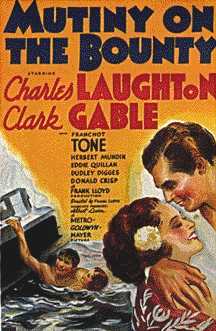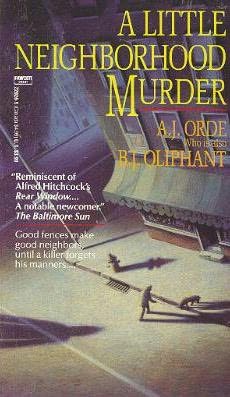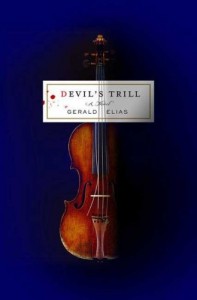
I'm in a bit of a bind here wanting to recommend all four books in this truly wonderful short-lived series, but only finding one on my shelves and not the first, but the third. Of course I've read all four books over the years but if you expect me to remember them in particular detail, then both of us are doomed to disappointment. (I always laugh when I think about the title of this meme: Forgotten Books Friday. Right. Truer words were never spoken.)
Old lady memory strikes again. All I can tell you is that these four titles by Jamie Harrison are some of the funniest, slyest, dryly wittiest, engagingly well-written books you will ever read. They leave a happy resonance in my faulty memory - a lingering, pleasant aftertaste of delight. That's why I'm recommending them today for the Friday's Forgotten Books meme usually hosted by Patti Abbot at her blog, PATTINASE. But filling in today for Patti is Rick at his blog, THE BROKEN BULLHORN. Link here to read all the contributors and their contributions.
What I'm going to do is post a choice excerpt from the AN UNFORTUNATE PRAIRIE OCCURRENCE which will give you a good idea of the sort of writing I'm talking about, the sort of writing I favor, and the sort of writing you should not miss. I will add though, that for whatever reason, Jamie Harrison appears to have stopped writing - I can't find any other books by her in any form. It's a damn shame, but who knows what life has thrown her way. Maybe someday, she'll return to her fictional world of Blue Deer, Montana and pick up the story where she left off.
Jules Clement was brown-haired, tall and angular. He was thirty-five and essentially solitary, currently locked into an unhappy phase in an at best intermittent love life. He had a fairly good sense of humor, but it had been beaten down lately by work. He was good at his job, despite a lack of self-confidence or despotic practicality. Jules was that final anomaly, a liberal officer of the law.
Whatever else could be said about Jules, no one had ever claimed he looked like a cop when out of uniform. A bartender, maybe, a carpenter or even a ski bum in his healthier moments. This morning waiting in a corner of the Honorable Miles Birdland's office to have an arrest warrant signed, he looked a bit like a fishing guide: he was wet to the knees from a dawn search for the missing Maryland diver. Four boats, twenty other searchers on the banks, all of it a massive waste of time undertaken largely to save a fisherman a nasty sight a week down the line.
Jules paged through the judge's magazines and politely avoided looking directly at the other people in the room.
Neil Admundsen, the judge's grandson and a deputy county attorney, was arguing, and he sounded reasonable enough until the gist of the conversation sank in.
"Mr. Jump had custody for September; Mrs. Jump had custody for October. It's spelled out in their agreement, alternate months."
Birdland's voice was querulous, dangerous. "He wanted to take the dog hunting, right?"
"Yes sir," said Peter Johansen, the defense attorney. "Their agreement cites that right, for the dog's own welfare. This is petty stuff."
"The mention is vague, and any hunting was to depend on Mrs. Jump's assent," Neil began. "Instead of asking her, Mr. Jump kidnapped the dog - "
"Spare me," said Miles Birdland. "You keep your mouth shut as well for the moment, Mr. Johansen." He shuffled through his papers, a thin, tall man, quick and graceful in his mid-seventies, with a border of dark hair and a bald spot that managed to look distinguished. He tended to listen intently while blinking slowly.....Sometimes Birdland seemed to simply fix on a face and unleash poetic venom, the way a shark might fix on a particular pair of thrashing legs at a crowded beach and bite. The man had a nose for assholes.
"This is a clear case of custodial interference," said Neil. "He came onto her property, broke her window to open the door - "
"If you'd like to push for burglary or property damage, be my guest. Waste county money. But I am not going to allow you to bring criminal charges against a man for taking his dog from his ex-wife - "
"Your Honor, you're showing bias by saying, 'his' dog."
There was an ominous silence. Jules lifted his eyes and met Peter's. Peter gave a tiny desperate shake of the head and stayed poker-faced.....The judge tapped his pen violently on a pile of paperwork.
"Neil, do you think I'm blessed with an abundance of time?"
Neil, only in his late twenties, had a surly look on his face that tamped down the handsome features and made them small and mean. "No, sir."
"What do you imagine I'd rather be doing?"
Jules feigned interest in a National Geographic article on mining in Indonesia. Peter stared at the ceiling. "Taking a walk?" asked Neil with just an edge of the smart-ass.
"Sitting with your dying grandmother!" screamed Birdland. "Now either go for a b-and-e or leave it to civil court."
Meetings with Birdland often ended in this fashion. He'd been a district judge for thirty years and tended toward brutal efficiency during court time, though his written opinions were Gothic and dense. You couldn't count on his sympathies, which his defenders took as proof of lack of bias, and which non-fans including Peter Johansen, put down to everything from indigestion, to reactionary politics to simple, old-fashioned meanness. Miles Birdland didn't have a predictable knee-jerk reaction to certain types, had no special blood lust for teenage dropouts, drinking mothers, child support shirkers, pot smokers versus drinkers versus pill poppers.
"Why are you here?" he asked Jules abruptly.
"Alston Hantz blew his parole twice over the weekend, and I need a warrant signed."
"Jesus," said the judge. The top of his head was still pink with rage. "Enough is enough."
"You would think," said Jules. "But Alston doesn't think."
"Did he at least try to be sneaky?"
"Showed up drunk as a monkey for happy hour at the Blue Bat on Friday, then hit the Bucket Sunday afternoon."
"I won't feel much compunction about sending him out of the county," said Birdland, handing Jules the warrant and moving on to the rest of his pile.
As if he ever felt compunction, Jules thought. He started to edge out the door, but the judge spoke again. "There's a rumor going 'round that you found a body on the island," he said, signing papers as fast as his secretary could hand them to him.
"Yes sir," said Jules. "Yesterday afternoon."
"Old or new?" The judge didn't look up.
"Old," said Jules. "Maybe several decades, unless there's something funny in the soil. I won't know more until I get out of here."
Birdland looked up and Jules kept his face unreadable, not a difficult task as his left jaw was crooked from a horse kick. That corner of his mouth tended to curl up in a gentle and often unfelt smile.
"Sorry to keep you from more important tasks," said Birdland with great sarcasm.
"That's, of course, not how I meant the comment," said Jules evenly.
The judge had missed a page, and when his secretary murmured a mild corrective he snatched it from her hand. "Well, good, " he said finally. "I was wondering if we'd have another mess on our hands, if I should simply retire now, let Axel age himself."
Miles Birdland was not given to humor, in the words of his tenacious secretary, now staring fixedly at the diplomas on the wall, the man was too dry to spit. Axel Scott was the county attorney, Neil's boss, and he wanted Birdland's job...
"No mess," said Jules. "I'm only worried about the rapist."
"I'd be surprised if you catch that man before I retire. I knew someone like him once, a man who kept his evil invisible in the daytime. This person could be the town's finest teacher, saving up pain for the night."
Encouraging words. Jules felt a glimmer of pity for Neil, who crawled in to apologize to his grandfather as Jules was walking out. It wasn't always easy, everyone being related to everyone else. Hardly any of the first settlers in Absaroka County had stuck it out, but in a town of new blood, virtually none had oozed through the courthouse walls. Until Axel Scott had pushed the country's lenient standards of nepotism that spring by hiring a twenty-six year old with only one year of experience, no one in town had seemed to mind that Scott was married to Jules's cousin Jetta, or that Jules and Peter had been roommates in college, or that Birdland's daughter and Scott's wife had been inseparable since kindergarten. Now Jules found himself minding; it was part of the reason he'd hired two out-of-towners as deputies that summer.
"What are you smiling at?" snapped Neil.
"Life's infinite variety," said Jules.
I do enjoy this sort of writing - quiet on the surface, ruffled underneath - which is the reason I'm always recommending it when I come across good examples. Though this series is, as I said, only four books along and probably done, I highly recommend you search it out. You'll find yourself in the occasionally wild Montana countryside, playing sidekick to the laconic Jules Harding, ex-archaeologist and current sheriff.
From the New York Times Book Review:<p>"Harrison takes her time resolving these criminal matters, allowing us to linger in Blue Deer long enough to learn its history, drink in the scenery and laugh at the kinks and quirks of its idiosyncratic residents. No wonder the world-weary Jules came running back home the first chance he got - the place is heaven."
Big Sky, old bones, and murderous obsession. Blue Deer Montana has it all.
The four titles in the series:
THE EDGE OF THE CRAZIES (1995)
GOING LOCAL (1996)
AN UNFORTUNATE PRAIRIE OCCURRENCE (1998)
BLUE DEER THAW (2000)




 Eleven Films in which Trains are, at least, part of the action: (I realize that there are many more films in which trains are featured but I wanted to stick with films I've actually seen.)
Eleven Films in which Trains are, at least, part of the action: (I realize that there are many more films in which trains are featured but I wanted to stick with films I've actually seen.) 

 It feels good and virtuous to suddenly be up on all the latest (some not so 'latest') phraseology. A few of these terms I admit I'd been curious about - just never curious enough to find out more. Now I don't have to. It's all here,
It feels good and virtuous to suddenly be up on all the latest (some not so 'latest') phraseology. A few of these terms I admit I'd been curious about - just never curious enough to find out more. Now I don't have to. It's all here,  The inimitable Calvin and Hobbes cartoons are by the inimitable Bill Watterson of which more can be read about
The inimitable Calvin and Hobbes cartoons are by the inimitable Bill Watterson of which more can be read about 

 ...I wish them well. What are we but creatures of symbols and ceremony after all? I'll watch on youtube today and smile and pretend to believe in happily ever after. Occasionally, it does come true. The Duke and Duchess of Cambridge. I like the sound of that.
...I wish them well. What are we but creatures of symbols and ceremony after all? I'll watch on youtube today and smile and pretend to believe in happily ever after. Occasionally, it does come true. The Duke and Duchess of Cambridge. I like the sound of that.


 My favorite Captain Bligh: Charles Laughton. No one in the world can say, "You traitorous dog," with quite the same snarling vituperation as Laughton. My favorite Fletcher Christian: oh, Clark Gable, hands down. As much as I adore Marlon Brando (at least in his early roles) he was not then nor would he ever be an 18th century man.
My favorite Captain Bligh: Charles Laughton. No one in the world can say, "You traitorous dog," with quite the same snarling vituperation as Laughton. My favorite Fletcher Christian: oh, Clark Gable, hands down. As much as I adore Marlon Brando (at least in his early roles) he was not then nor would he ever be an 18th century man.
 Since I posted some of my favorite Phillip Marlowe quotes earlier this week, I thought I'd do the same for Holmes. These quotes have been handily collected in one nice little book by John H. Watson, M.D. With An Introduction by John H. Watson III and Assisted by Gerard Van Der Leun.
Since I posted some of my favorite Phillip Marlowe quotes earlier this week, I thought I'd do the same for Holmes. These quotes have been handily collected in one nice little book by John H. Watson, M.D. With An Introduction by John H. Watson III and Assisted by Gerard Van Der Leun. 
 Okay, I saw this video a few moments ago and loved it. Too funny! And may I say that I am not a fan of Jersey Shore (the tv show) - in fact, I've never seen it (nor under anything but the threat of immediate, excruciating death, would I do so) so I'm kind of operating blind here. I'll take it for granted from things I've read online that the show is a vulgar exploitation of type - fine. I suppose it appeals to those fond of watching self immolation and reality car crashes. (Not that there's anything wrong with that.)
Okay, I saw this video a few moments ago and loved it. Too funny! And may I say that I am not a fan of Jersey Shore (the tv show) - in fact, I've never seen it (nor under anything but the threat of immediate, excruciating death, would I do so) so I'm kind of operating blind here. I'll take it for granted from things I've read online that the show is a vulgar exploitation of type - fine. I suppose it appeals to those fond of watching self immolation and reality car crashes. (Not that there's anything wrong with that.)

 In my probably biased opinion, there are maybe four or five really terrific Charlie Chan movies - this is one of them. I am a big fan of Charlie's, so if one of the early movies is on, I'm likely to watch it regardless. Though I like Warner Oland as Chan, better than Sidney Toler, I admit that Toler grew on me and did go on to make several favorites. But once Mantan Moreland got involved in the films and the budgets went down to zero, I stopped watching. There's a nice envelope of time - 1930's - mid 40's, when the films were still reasonably good. Most especially if you didn't care if the plots made any sense. Because, honestly, the scriptwriters/film-makers apparently didn't care either. If you break down the nuts and bolts of the mysteries, you get to the end and go, huh? But, so what. Logic is not why anyone watches Charlie Chan movies - at least I don't think so.
In my probably biased opinion, there are maybe four or five really terrific Charlie Chan movies - this is one of them. I am a big fan of Charlie's, so if one of the early movies is on, I'm likely to watch it regardless. Though I like Warner Oland as Chan, better than Sidney Toler, I admit that Toler grew on me and did go on to make several favorites. But once Mantan Moreland got involved in the films and the budgets went down to zero, I stopped watching. There's a nice envelope of time - 1930's - mid 40's, when the films were still reasonably good. Most especially if you didn't care if the plots made any sense. Because, honestly, the scriptwriters/film-makers apparently didn't care either. If you break down the nuts and bolts of the mysteries, you get to the end and go, huh? But, so what. Logic is not why anyone watches Charlie Chan movies - at least I don't think so.  In the meantime, Lily Rochelle, played with exaggerated (and charmless) diva mannerisms by Margaret Irving, goes to the police (Inspector Regan played by Guy Usher), escorted by her current paramour, tenor Enrico Borelli (played by Gregory Gaye). She's received some threatening letters and wants police protection. The cops haven't yet linked Gravelle to Lily.
In the meantime, Lily Rochelle, played with exaggerated (and charmless) diva mannerisms by Margaret Irving, goes to the police (Inspector Regan played by Guy Usher), escorted by her current paramour, tenor Enrico Borelli (played by Gregory Gaye). She's received some threatening letters and wants police protection. The cops haven't yet linked Gravelle to Lily.
 In the first act scene, however, Mephistopheles is supposed to stab Lily (who is a little old to be playing an innocent village maiden, but what the heck) and the cops are uneasy as they watch the scene develop. Lily, herself, is aware that something is wrong since the man singing Mephistopheles doesn't sound so much like Borelli, but like the man who was once her husband and fellow opera star - a man who supposedly died in a fire. Lily is so frightened that as the act finishes, she faints and must be carried to her dressing room. Gravelle escapes from the cops who chase him backstage.
In the first act scene, however, Mephistopheles is supposed to stab Lily (who is a little old to be playing an innocent village maiden, but what the heck) and the cops are uneasy as they watch the scene develop. Lily, herself, is aware that something is wrong since the man singing Mephistopheles doesn't sound so much like Borelli, but like the man who was once her husband and fellow opera star - a man who supposedly died in a fire. Lily is so frightened that as the act finishes, she faints and must be carried to her dressing room. Gravelle escapes from the cops who chase him backstage. When both Borelli AND Lily Rochelle are killed - stabbed to death. The obvious culprit is the handy escaped maniac.
When both Borelli AND Lily Rochelle are killed - stabbed to death. The obvious culprit is the handy escaped maniac. 






 For all of you who celebrate this weekend, I wish you joy and a very Happy Easter. I'll be celebrating with family and friends, including my absolutely beautiful granddaughter. (Yes, I am one of those mushy grandmas, and PROUD of it!) Ha!
For all of you who celebrate this weekend, I wish you joy and a very Happy Easter. I'll be celebrating with family and friends, including my absolutely beautiful granddaughter. (Yes, I am one of those mushy grandmas, and PROUD of it!) Ha! 
 These lush flowers look drowsy, languid and lazy. Love the varying shades of pink and the little pansy tucked in among its more elegant brethren.
These lush flowers look drowsy, languid and lazy. Love the varying shades of pink and the little pansy tucked in among its more elegant brethren.










 Came back from the library staggering under the weight of nine books. Just lugging them into the house was enough. I get carried away sometimes, reserving on line. It's just so damn easy.
Came back from the library staggering under the weight of nine books. Just lugging them into the house was enough. I get carried away sometimes, reserving on line. It's just so damn easy.

